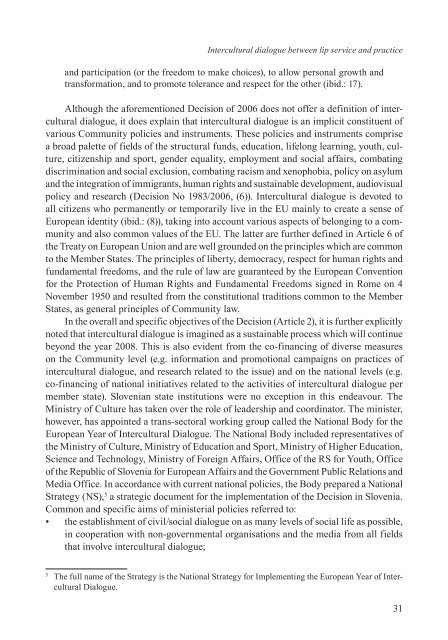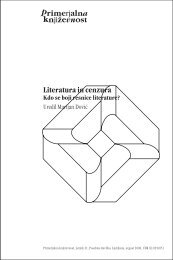30 • 2009 - Dve domovini / Two Homelands - ZRC SAZU
30 • 2009 - Dve domovini / Two Homelands - ZRC SAZU
30 • 2009 - Dve domovini / Two Homelands - ZRC SAZU
Create successful ePaper yourself
Turn your PDF publications into a flip-book with our unique Google optimized e-Paper software.
Intercultural dialogue between lip service and practice<br />
and participation (or the freedom to make choices), to allow personal growth and<br />
transformation, and to promote tolerance and respect for the other (ibid.: 17).<br />
Although the aforementioned Decision of 2006 does not offer a definition of intercultural<br />
dialogue, it does explain that intercultural dialogue is an implicit constituent of<br />
various Community policies and instruments. These policies and instruments comprise<br />
a broad palette of fields of the structural funds, education, lifelong learning, youth, culture,<br />
citizenship and sport, gender equality, employment and social affairs, combating<br />
discrimination and social exclusion, combating racism and xenophobia, policy on asylum<br />
and the integration of immigrants, human rights and sustainable development, audiovisual<br />
policy and research (Decision No 1983/2006, (6)). Intercultural dialogue is devoted to<br />
all citizens who permanently or temporarily live in the EU mainly to create a sense of<br />
European identity (ibid.: (8)), taking into account various aspects of belonging to a community<br />
and also common values of the Eu The latter are further defined in Article 6 of<br />
the Treaty on European Union and are well grounded on the principles which are common<br />
to the Member States. The principles of liberty, democracy, respect for human rights and<br />
fundamental freedoms, and the rule of law are guaranteed by the European Convention<br />
for the Protection of Human Rights and Fundamental Freedoms signed in Rome on 4<br />
November 1950 and resulted from the constitutional traditions common to the Member<br />
States, as general principles of Community law.<br />
In the overall and specific objectives of the Decision (Article 2), it is further explicitly<br />
noted that intercultural dialogue is imagined as a sustainable process which will continue<br />
beyond the year 2008. This is also evident from the co-financing of diverse measures<br />
on the Community level (e.g. information and promotional campaigns on practices of<br />
intercultural dialogue, and research related to the issue) and on the national levels (e.g.<br />
co-financing of national initiatives related to the activities of intercultural dialogue per<br />
member state). Slovenian state institutions were no exception in this endeavour. The<br />
Ministry of Culture has taken over the role of leadership and coordinator. The minister,<br />
however, has appointed a trans-sectoral working group called the National Body for the<br />
European Year of Intercultural Dialogue. The National Body included representatives of<br />
the Ministry of Culture, Ministry of Education and Sport, Ministry of Higher Education,<br />
Science and Technology, Ministry of Foreign Affairs, Office of the RS for Youth, Office<br />
of the Republic of Slovenia for European Affairs and the Government Public Relations and<br />
Media Office. In accordance with current national policies, the Body prepared a National<br />
Strategy (NS), 5 a strategic document for the implementation of the Decision in Slovenia.<br />
Common and specific aims of ministerial policies referred to:<br />
<strong>•</strong> the establishment of civil/social dialogue on as many levels of social life as possible,<br />
in cooperation with non-governmental organisations and the media from all fields<br />
that involve intercultural dialogue;<br />
5<br />
The full name of the Strategy is the National Strategy for Implementing the European Year of Intercultural<br />
Dialogue.<br />
31

















